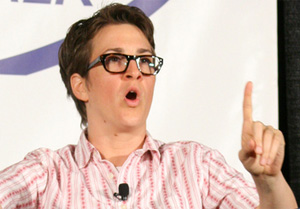
Read the condensed version of this interview here.
Mother Jones: You’re TV’s “It Girl.” How does it feel?
Rachel Maddow: It doesn’t feel like that. Mostly the thing that I am conscious of is that I am doing a new job, which is a hard job, and it’s a lot of fun but I have a lot to learn before I’m good at this, before I’m spending my time in a smart way and doing stuff on the air every day that I’m proud of. Mostly I’m just focused on that. Publicity and the good ratings thus far have been great, but I’m trying not to pay attention to them.
MJ: Why do you think your popularity took off so explosively?
RM: Two things happened. One, I opened up an umbrella factory at the start of monsoon season. Everybody’s ratings went up and for me to have stepped in at that moment, immediately after the conventions, made me look like a genius because I was getting good ratings. I was getting this explosive rating, but so was everybody. I think I benefited from being the new kid in that environment. The other thing was that Keith Olbermann’s ratings are off the charts. So I have the best lead-in in cable news. I think I grew into host material as his guest host and somebody whom he advised his audience members to pay attention to. That would have been a huge boost at any time, but for that to have happened at a time when his ratings were redlining was a great combination with what was going on with the overall tone of the campaign. I just hit the contextual lottery.
MJ: Not since Stephen Colbert has there been a better lead-in.
RM: Exactly.
MJ: You have risen to fame critiquing the Bush administration. Will your show change now that Democrats control everything?
RM: I think it was going to change regardless. Not having the campaign to cover is the biggest change. In terms of there still being stuff that is outrageous, funny, inspiring, and interesting going on in the news, I don’t think that quantitatively changes.
MJ: People ask this question of us all the time. Without that foil, is it an easier job? Is it as fun a job?
RM: Wouldn’t it be amazing if the problem in news was trying to figure out what to talk about? That’s never been an issue for me. There’s probably been, I don’t know, three days in the nine years I’ve been in radio where I’ve felt like I was reaching, and that’s usually because I’m hungover. I don’t think finding something interesting to talk about is ever an issue. It is funny that people always think there was an issue. As if Fox News did really poorly with Bush in the White House?
MJ: You’ve also brought in a circle of pundits and reporters you deem worthy of talking to. Why do you think the old networks are so clubby?
RM: I think that I have a new and different club. I don’t know how other networks work, but I think we have a lot of say over who we have on our shows. We like to talk to people who we have good conversations with and who we think are credible and interesting. I am new, and I don’t know exactly who’s going to be in my club. I have a bias toward reporters and experts rather than analysts. Maybe that’s something that’s slightly different because that’s my taste. I’m not setting out trying to do anything deliberate; I’m trying to find people who are really good on TV who I’m good at talking to and who I learn things from.
MJ: A lot of people who are good reporters are not necessarily good at prepackaged sound bites, but then your show allows people to speak with greater complexity than most.
RM: I don’t like to set people up to have fights with each other. I don’t do multiple guests, so maybe that’s part of it. But even in that format, you can be bad at it. It’s not necessarily a forgiving format; you need to be able to make a cogent point, have a story, get your joke in, get your sound bite in, and finish. The format is demanding; it’s just not generic.
MJ: You seem to exist in the space between the traditional and the new shows like Colbert and The Daily Show. How conscious was that in the planning of the show?
RM: I didn’t deliberately set out to be like anything, but I do feel like I am of an age and a media consumer type that I’m undoubtedly subconsciously influenced by Stewart and Colbert. You know how it is —we all consume that stuff. And they are really influential.
MJ: Coming from the famous non-TV watcher?
RM: I’ve actually never watched the Colbert Report or The Daily Show on TV, but I’ve seen a ton of their footage, because it gets circulated; it’s viral. I am influenced by them, just as I’m influenced by Keith’s show, something I’ve seen a disproportionate amount of as well. But I’m a sarcastic person. I learn through humor. The way I remember the best political lines and the best political diagnoses is when they are punch lines. I try to use that as a tool in order to make points because I think it’s useful in the same way storytelling is useful, and that funny voices are useful, and emotion can sometimes be useful.
MJ: You’re representing on a lot of different fronts. A lot of people can identify with you: women, youngish people, gays and lesbians, lefties, Oxford doctorates, comic book enthusiasts…
RM: People who aren’t conventionally attractive or who aren’t a size zero, people with unruly hair.
MJ: That must be a lot of pressure.
RM: Well, it would be if I thought about it. But it’s just me and my conscience. That’s my only real audience. I care a lot about what my girlfriend thinks, and my friends, but ultimately it’s me in the mirror. I just want to be proud of what I do.
MJ: Speaking of mirrors, you changed your look a lot for TV. How was that handled?
RM: It wasn’t at anybody else’s encouraging. It just sort of happened because I wanted my appearance to not be the only thing people could pay attention to when I was on television. I wanted people to hear what I was saying, so essentially I was seeking genericness.
MJ: Will women eventually be able to host a show and wear glasses?
RM: I’m not sure MSNBC would stop me from wearing my glasses now if I wanted to. The problem is technical, in that my frames are cheap plastic and they reflect. When I first got the show, my staff researched me in part by looking at these video podcasts I did when I was at Air America, and in most of those I wore my glasses. They were all very upset when they found out I couldn’t wear my glasses on the show. But they look bad. It looks like they’ve got spangles on them.
MJ: Although back in the Kennedy era, everybody wore big, chunky glasses on air.
RM: Women or was it all dudes?
MJ: It was all dudes.
RM: I mean, I’m sort of in “Dude Looks Like a Lady” territory anyway.
MJ: While you were at Stanford you were disastrously outed: You’d asked the interviewer to hold a story until you could tell your parents, but they didn’t. How does that make you feel about outing?
RM: Well, that was more of a bumbling issue than an outing issue. That was me asking them when they were going to run the story, and they told me, and I said, “Oh, good, because I’m going to go home this weekend and tell my parents, so I’m glad that it’s not running this week.” And then they went ahead and ran it. I don’t think they did it out of malice. It was a student paper, and it just happened. Somebody did mail the interview to my parents, which was, I think, a malicious act, but you can spend your life being mad or realize you were dumb and didn’t protect yourself.
MJ: But the first lesbian talk-show host…I don’t know what title you’d use…
RM: It’s a very small glass ceiling I’ve broken.
MJ: [Laughs.] …And the issue in general?
RM: I’m in favor of outing when people have demonized or scapegoated gay people for their own public gain. When they have risen to public prominence on the backs of the gay community that they are part of and they prey on, I think that’s absolutely deserving of outing. I don’t think there are many of those circumstances. I don’t think just being a Republican is reason enough.
MJ: Or a famous actor or something.
RM: Yeah, unless you’re a crusading Stephen Baldwin type, you know? Actually I shouldn’t say that, because I don’t know enough about Stephen Baldwin to say that, but if you were a crusading anti-gay actor. I think mild personal hypocrisy—sneaking around—you don’t deserve to be outed for that unless you happen to have achieved your political office at least in part on the basis of your campaigning as a family-values paragon. I think it’s community defense. It’s one way gay people need to stand up for ourselves.
MJ: You’ve been an activist. Is being a journalist influenced by progressive values the same thing?
RM: No. I think activism is a very specific thing. Activism is setting a goal of something you would like to be different, and figuring out what would have to change to achieve that goal. It’s sort of like math. You figure out who’s the decision maker; you figure out who can make that happen in order for you to get your desired outcome. Then you figure out the points of leverage that might move that person, or that set of circumstances, so that your desired outcome might come to pass. Then you figure out what connects you to those points of leverage, and you exert leverage on them. You’re trying to get an outcome and you’re trying to figure out what tools are at your disposal in order to get that outcome to pass. What I’m doing in broadcasting isn’t anything like that. Even though I’m still being myself and I’m telling you what I think about things, I’m not trying to change things in the world and trying to use my leverage to do so. The only thing I’m trying to change in the world is that I’m trying to increase the amount of useful information in it. And entertainment, honestly.
MJ: Speak of your love of Pat Buchanan.
RM: Aww. Pat is a good debater, and I love that, and he has strong beliefs. He is good at making his own case. He listens to people who disagree with him and he’s not condescending. One of the things I like the most about Pat is that he doesn’t talk down to me. We were matched up initially in a lot of unequal situations. He was guest hosting some of the first shows that I ever appeared on as a guest, and even though he had every reason to be dismissive of me—and this was well before I looked okay enough to be on television—he asked me hard questions, listened to my answers, took my answers seriously, took time to rebut me, and, all in all, I felt like was a real honest broker in terms of the intellectual jousting we were literally being paid to do. I enjoy that.
MJ: He has a great laugh.
RM: He does. And he knows a lot. He’s been in the middle of a lot of stuff that people want to talk about. You want to talk Watergate? He was there. You want to talk everything about Nixon, he was there. You want to talk culture war? That was him. He’s been there. Southern strategy, comma, Buchanan. He’s a primary source, and he’s got a really good memory.
MJ: Does he get it when you introduce him with an “It’s Pat!” headline?
RM: I don’t know. We talk about culture stuff, and we have some overlap in terms of our tastes, but we’ve never talked TV shows, so I don’t know if he’s an SNL guy.
MJ: In your spare time, you’re writing a book about the influence of politics on the US military. First of all, what is this spare time you claim you have?
RM: I took a couple of weeks off in advance of the election, just because I didn’t have any free time and I was filling myself with guilt in terms of not working on the book, and so tomorrow I’m back on the wagon working on the book. I do that Tuesday through Friday mornings. I work on the book before I go to Air America.
MJ: You do sleep?
RM: I do sleep. I haven’t had dinner today. So I will go to the bar and have shrimp tacos, and I will read the last few segments of the Newsweek election report. So I’m going to go read that with shrimp tacos and a Guinness before I retire for the evening before I’m up at 8. I’ll be back on the book schedule. There’s a little time. There’s time to brush my teeth in there.
MJ: Do you think Obama will change the focus of the book?
RM: I don’t think so. My focus is mostly post fall of the Berlin Wall. It starts at the atomic age, sort of thinking about America’s relationship to the idea of military power and toward the idea of men in uniform among us, and how we go where we want as a country. I do think that Obama has the potential to make some real progress on this front, but I haven’t seen any indications of that yet. My central thesis is that we need more politics in the military. There needs to be more of a political discussion about the use of military force. This idea of “the foreign policy consensus” essentially gave members of Congress an excuse to be hands-off about decisions about the use of military force for reasons that never got debated and were often scandalous when they came to light.
MJ: It’s amazing how people who are supposed to be on opposite sides on those issues just start to reinforce each other.
RM: And I think we’ve reached a point now—and the Bush administration put a rocket booster on an already accelerating drag racer—especially with privatization and the Bush Doctrine and the mission creep that we’ve seen in Iraq and Afghanistan. We’re at a place where the uniformed military is among the most powerful forces for there to be more politics in military matters. The number of Iraq veterans who ran for Congress this year? Holy shit. And it’s not an accident. To have the Democratic Party become the party of the veterans? There’s a realignment happening at the urging of members of the military who are sick of being used.
MJ: Who would be your nominee for secretary of defense?
RM: I haven’t really been thinking about it in those terms. I like Bob Gates. I always say on the radio that if the Bush Cabinet were an orphanage and it were on fire, I would rush in and save Bob Gates. He would be my orphan. I don’t dislike him, but I do think that it would be hard to hold on to him without holding on to everybody else who’s still in the Pentagon in senior civilian positions. A lot of those people are left over from Rumsfeld.
MJ: Should women forgive Larry Summers if Obama nominates him to be treasury secretary?
RM: How about Native Americans? Who do we ask for forgiveness for him saying he would send pollution to underpolluted and underpopulated areas of Africa? Women can start at the head of the line.
MJ: I’m sort of amazed they’re even floating his name. Do you really want to go through that confirmation battle?
RM: It’s one thing in terms of being a liability and what you have to take time to explain about him and the amount of political capital you have to spend to get him in. But remember, he’s a deregulator. If you look at his free-trade, deregulation history—sure it was at a different time in American history and American politics, but right now I’m not really sure that’s what we need. I’m not sure America’s clamoring for Larry Summers and Bob Rubin to get back in there and make sure we get rid of some of the red tape. I think the moment might have passed for these guys.
MJ: Since you have expressed your love for both classic cocktails and comic books, I’m wondering if you could name a few, and maybe even a pairing.
RM: There’s a really good graphic novel called American Born Chinese, which I could recommend. Alison Bechdel’s Fun Home, obviously, is really great. I’m a big fan of the series that’s called Queen and Country. That’s my one true love; if graphic novels were in an orphanage and the orphanage were on fire, I’d rush in and save Queen and Country.
MJ: And you’d read Queen and Country sipping a…?
RM: That’s a very good question. There’s a great drink called a purgatory, and Queen and Country is all about emotional and bureaucratic purgatory. It’s 100-proof rye, Benedictine, and Chartreuse. It’s a kick in the teeth. It’s perfectly balanced and wonderful, and it’s super-alcoholic. I like big drinks that aren’t afraid of the alcohol in them. Not big in size, but in flavor, and the way I can allow myself to enjoy them is by making them in very small quantities. I make tiny glasses of very big drinks.
MJ: Any cocktail you think is particularly overrated?
RM: I don’t drink vodka. I don’t think vodka is useful. I think it’s for people who don’t like alcohol, in which case, you probably shouldn’t be drinking it. I also don’t drink any flavored spirits. I realize there is a move among ambitious cocktail people to infuse their own spirits, but I just can’t be bothered. I feel like if the ingredient existed in 1895, I’m interested in it. If not, I’m not interested in it.
MJ: Olbermann renegotiated his contract for a reported $7.5 million a year. When do you get to renegotiate?
RM: For $7.5 million? Ha! It remains to be seen whether I’m a flash in the pan. I haven’t been on the air that long, and my initial ratings were great, but I’ve got a lot to prove.
MJ: Is smart the new black?
RM: [Laughs.] Black is the new black.
MJ: I have to tell you, a friend of mine, when Prop 8 passed, said, “The only thing that’s keeping me feeling a little bit positive is how well Rachel is doing.” It’s nice to see people expanding their roster of whom they’ll have on and airing the whole format out.
RM: The good thing about being—I don’t want to call myself a pioneer, so I won’t, but you know what I mean—is that you get to bring your peeps with you. And it’s not out of some effort at affirmative action, but you represent your own experience in the environment you get into. So, for me, the opportunity to get David Corn, Steve Clemens, and Melissa Harris-Lacewell and all my other peeps on the air is the best side effect ever.
MJ: Still, it’s nice that you have a hipster sensibility. There’s something so homogenized about the news on every level.
RM: Working in news is a homogenizing lifestyle—that’s part of the problem. People say, “You seem too normal.” Well, yeah, I’ve been in this industry for six weeks. Wait until I’ve been working 14 hours a day and having no outside life for five years. Then tell me I’m still normal. No, I won’t be. I’ll only exist based on what I get from the Hotline feed from the internal and news website.
MJ: Hopefully it will not come to that.
RM: Hopefully you’ll beat me and keep me real.









